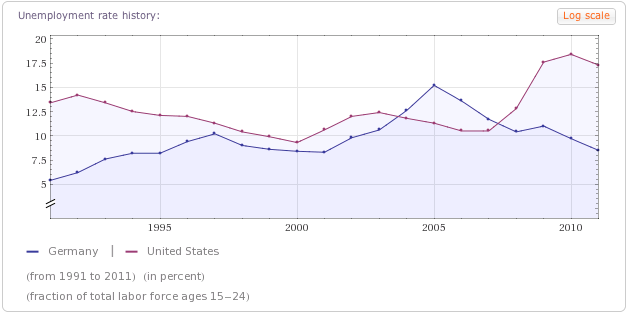Surprise! Harvard economist gets everything wrong about unpaid internships

Edward Glaeser, an economics professor at Harvard, recently penned a defense of the unpaid internship. There's so much wrong going on in this op-ed that I'm going to blockquote extensively, but please read the piece in its entirety first. After mentioning the closure Conde Nast's internship program, which was threatened by lawsuits from former interns, Glaeser lays out the case for working for free.
Well, free for your employers, not for you, because you should really just take out a few more student loans while you're at it:
In a variety of industries, current students and recent graduates don’t yet have the skills and experience needed to contribute meaningfully to an employer’s success, and even entry-level paid positions attract an ample supply of well-qualified applicants. In these cases, internships are one tool for turning unskilled neophytes into able veterans who can better compete for full-time jobs.
Instead of ending unpaid internships, we should promote those that deliver real skills, and we must find ways — perhaps through student loans — to help less-privileged students take part in certified skill-building internships.
Student loan debt has topped $1 trillion and is helping ruin our current and future economy, while corporate profits are at record heights. Yet because this is Edward L. Glaeser we're reading, the burden of financing these internships should rest on the already-indebted students, not the employers who are making a profit off them. And because such a solution would be part of a student loan, students have the added benefit of not only paying for the privilege of a job, but also then paying interest on it to Wall Street for years to come. (It'd be a matter of minutes before Internship Debt Swaps emerge to fully financialize it.)
He continues:
Almost 13 percent of Americans ages 20 to 24 are unemployed. To some degree, this reflects a skills deficit that other countries address far more directly than the United States does. Germany’s apprenticeship model has long provided practical skills to younger workers, and the unemployment rate for Germans age 20 to 24 is under 8 percent.
Under the US Fair Labor Standards Act, unpaid internships can avoid minimum wage rules only if interns learn skills “similar to training which would be given in an educational environment.” The training requirement is essential and could be strengthened. If interns are given mindless jobs that don’t expose them to new people or ideas, then their employer has reneged on a promise, and they have a right to sue. Public policy could do a better job of encouraging former interns to anonymously rate their former employers, and publicizing the results.
Glaeser knows that there's a big problem with unpaid interns not being trained to do anything beyond memorizing management's daily Starbucks requirements and using the copier. His nodding approval of the current remedy, taking the employer to court, is laughably implausible, particularly for the young people who are most exploited. And even if you could cobble together the resources and discount lawyers to win, you'll have a public record of suing your employer available for every prospective boss to see.
There are already a few internship review sites out there, so that you can know in advance from a previous intern that working for Teen Vogue is "Good for your resume, but not for your spirit." But internships are scarce, compared with those who want them, so I'm not sure what benefit more ratings would provide — landlords widely known to be total assholes still get a steady stream of willing tenants, especially in large cities.
As for Germany's apprenticeship program, it is indeed heralded as a major factor in keeping youth unemployment down: nations around the world are beginning pilot programs to see if the model can work elsewhere. But the verdict is far from in. If you compare pre-recession youth unemployment numbers, you find a much more mixed story:
Clearly there is a lot more going on. Simply pointing to an apprenticeship program is unhelpful because the German and U.S. economies are structured so differently. As an excellent Atlantic article on the topic (very much worth reading) summed up:
So for President Obama to cite Germany's vocational training for youth as a model is certainly a step in the right direction. But the German example cannot be cherry-picked. It is the sum of its parts -- from vocational training, through the strength of its SMEs [small to medium sized enterprises, which in Germany are mostly manufacturing], to its high-productivity export focus -- that makes it the envy of so many Americans.
But here's where Glaeser really loses coherence. The German model is highly regulated and overseen by the government, and involves the companies actually paying their apprentices pretty damn well. Yet two paragraphs later:
At the same time, it’s unrealistic to think individual private businesses will provide new skills to temporary, not-yet-qualified workers simply out of public benevolence. Throughout much of Western history, young apprentices paid to learn — either explicitly with cash or implicitly by working for little pay. James Watt, whose steam engine helped power the Industrial Revolution, learned instrument making by working as an unpaid apprentice for 10 hours a day. Indeed, Watt paid 20 guineas for that privilege
But wait, isn't business providing new skills to not-yet-qualified workers precisely what his vaunted German model does? Though German companies don't think of it as public benevolence: they understand that a highly-skilled workforce helps everyone, including themselves. Only the supremely petty and shortsighted owning class in the United States (and their Harvard apologists) couldn't see the very clear long-term benefits.
If Glaeser was truly looking for reasons why German youths are employed twice as much as U.S. students, he would have started with the fact that tuition in Germany is entirely free.
Moreover, like most economists Glaeser gets his history wrong. "Much of Western history" (which for economists usually means the British Isles going back to around 1500), had a very different economic setup than we do now, and as such apprenticeships held a very different place in society. As David Greaber describes it:
In a typical Medieval town, the majority of young men were apprentices and journeymen in the employ of an older master craftsman. Ideally, any apprentice could expet to someday become a master himelf, and full member of the guild — it was for this reason guild regulations limited the number of apprentices a master was permitted to take on. But the more capitalist relations came to dominate a given industry, the longer a journeyman would have to wait before being able to achieve full adult status, a wife, a household, and a shop of his own. In the meantime, he would continue working for wages for his master. The result was that a large part of the work force, men in their thirties and forties, found themselves living in a sort of suspended social adolescence. In the end, many began to to abandon the idea of autonomy entirely, to marry young and resign themselves to the status of permanent wage laborers. With the enclosure movements and rise of commercial agriculture of the sixteenth and seventeenth centuries, many of the rural poor were left in much the same position.
For all the exhaustion and deprivation Watt experienced, at least the Master he worked for provided a roof over his head. The realities of modern capitalism have all but eliminated the traditional apprenticeship model outside a very few sectors. Whereas one used to apprentice to escape wage labor, today we apprentice merely to enter it.
After a perfunctory plug for the institute he runs, which gives stipends each year to a whopping twelve unpaid interns, Glaeser concludes:
Critics are right to worry that unpaid internships provide access only to students from wealthy families. One solution might be to expand federal student loan programs to cover students taking unpaid internships, whether or not they receive college credit for them, or even recent graduates. I would set a high bar for making internships eligible for such loans, by requiring official certification of their educational quality. With a loan program in place, more widespread unpaid internships could help move young Americans toward permanent employment. Internships provide a pathway towards employment that should be encouraged — not penalized.
Glaeser's call for a "high bar" on which employers would qualify for student loan-backed internships doesn't recover what is an irredeemably bad idea. Youth would continue to pay for their exploitation, and the intensely competitive environment these scarce positions would create would also mean any student would be crazy to blow the whistle if their work became increasingly menial.
Not that I take seriously any call by Glaeser to increase the number of employment regulations, given his track record. For example, he's written extensively against the minimum wage, against requiring employers offer paid sick days, has warned that presumptive New York City Mayor Bill DeBlasio's suggested workplace regulations "will only deter" the city's "entrepreneurs," and just recently grilled the two Boston Mayoral candidates in a public forum on cutting regulations.
Hat tip to @MaxwellJohnLove for alerting me to this op-ed.
